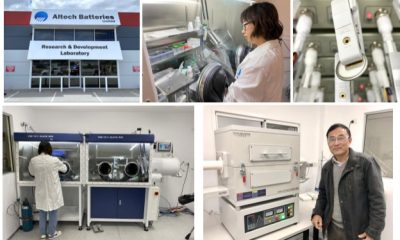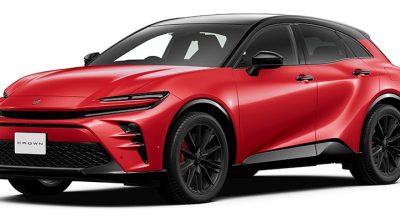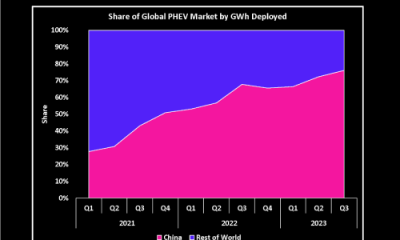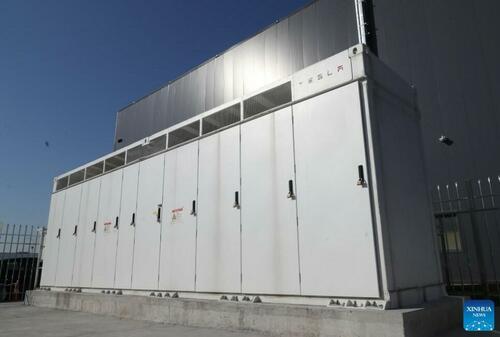Energy & Critical Metals
Toyota Planning To Triple EV Output To 600,000 Vehicles By 2025
Toyota Planning To Triple EV Output To 600,000 Vehicles By 2025
Make no mistake about it: the race to head up the electric vehicle war appears…

Toyota Planning To Triple EV Output To 600,000 Vehicles By 2025
Make no mistake about it: the race to head up the electric vehicle war appears to be the sole objective for automakers not just in the U.S., but around the world.
With that, Toyota is dramatically intensifying its focus on electric vehicles, according to a new report from Nikkei, with plans to triple its EV output by 2025 from planned production numbers for 2024.
Aiming to stay competitive with EV market leaders like Tesla and BYD, Toyota has informed its primary parts suppliers that it plans to manufacture 600,000 EVs under its Toyota and Lexus brands in 2025, a significant jump from its 190,000-unit target for 2024. The automaker sold just 24,000 EVs in 2022.
For perspective, Toyota aims to produce more than 10 million vehicles in total for 2023, including approximately 150,000 EVs.
By 2025, the company expects to roll out 11 million vehicles overall, with EVs comprising 5% to 6% of that figure. An executive from a parts supplier estimates that, including original equipment manufacturer (OEM) models, Toyota’s EV sales in 2025 could approach 800,000 units, the report says.
This ambitious scaling-up includes the launch of an electric Hilux model in Thailand later this year, electric SUVs in China and the U.S. next year, and an electric Lexus ES in Japan by 2025. Moreover, Toyota is collaborating with Suzuki Motor and subsidiary Daihatsu Motor to create electric versions of mini commercial vehicles.
In the United States, a specialized plant scheduled to become operational in 2025 will primarily produce EV batteries. Production lines for batteries will also be established at two Aichi facilities, with battery subsidiary Prime Planet Energy & Solutions slated for production expansion.
By 2026, Toyota intends to roll out a next-generation EV platform beginning with Lexus models, featuring gigacasting technology that streamlines aluminum molding for vehicle chassis, thereby conserving time, funds, and labor. The long-term objective is to sell 3.5 million EVs by 2030, with 1.7 million utilizing this new platform.
Nikkei notes that while the emphasis on electric vehicles is growing, Toyota’s overarching strategy remains committed to diversifying its power sources, including traditional gasoline and hybrid models. However, its current EV offerings face profitability challenges and lag in sales when compared to frontrunners Tesla and BYD.
EVs have become such a point of contention that the EU recently opened an investigation into China’s EV subsidies, claiming they were disruptive to the market. Chinese state mouthpiece The Global Times published a rebuttal earlier this month, claiming that the EU’s probe would likely “backfire” and that the EU’s economy would suffer as a result.
“Clearly, Europe is afraid,” The Global Times wrote. “They are afraid of competition from China, so they want to seek trade protectionism as a protective umbrella for European auto makers who are slowly transitioning toward electrification.”
China says that the EU should “have enough courage to face competition from their Chinese counterparts directly.”
At a time when tensions between China and the EU have been simmering for months, European Commission President Ursula von der Leyen is taking exception with the fact that “the global market is flooded with cheap Chinese cars”, we noted earlier this month, citing Bloomberg.
Speaking to parliament earlier this month, von der Leyen said: “Their price is kept artificially low by huge state subsidies. This is distorting our market. And as we do not accept this distortion from the inside in our market, we do not accept this from the outside.”
We also noted this summer that the push for EVs is so crucial, automakers like Ford are voluntarily losing billions on it as they adapt, just to be a the forefront of the industry.
Tyler Durden
Mon, 09/25/2023 – 19:20
batteries
electric vehicle
aluminum

Uranium Exploration Company Announces Additional Staking in the Athabasca Basin
Source: Streetwise Reports 12/22/2023
Skyharbour Resources Ltd. announced an update from its Canada-based Falcon Project along with additional…
Tesla Launches New Mega Factory Project In Shanghai, Designed To Manufacture 10,000 Megapacks Per Year
Tesla Launches New Mega Factory Project In Shanghai, Designed To Manufacture 10,000 Megapacks Per Year
Tesla has launched a new mega factory…
Giving thanks and taking stock after “a remarkable year”
An end-of-year thank you to our readers, industry colleagues and advertisers before Electric Autonomy breaks from publishing until Jan. 2
The post Giving…



















